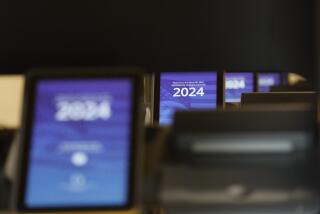How smart is the American voter?
One of the bestselling books of the 2008 election season has been “Just How Stupid Are We?” by popular historian Rick Shenkman. It presents a familiar collection of bleak results from opinion surveys documenting the many things most Americans don’t know about politics, government and history. “Public ignorance,” Shenkman concludes, is “the most obvious cause” of “the foolishness that marks so much of American politics.”
But is that really true? Does it matter whether voters can name the secretary of Defense or whether they know how long a U.S. Senate term is? The important question is not whether voters are ignorant but whether they make sensible choices despite being hazy about the details. (OK, really hazy.) If they do, that’s not stupid -- it’s efficient.
Political scientists have been studying this subject for years, and they’ve found plenty of grounds for pessimism about voters’ rationality.
In the early 1950s, Paul Lazarsfeld and his colleagues at Columbia University concluded that electoral choices “are relatively invulnerable to direct argumentation” and “characterized more by faith than by conviction and by wishful expectation rather than careful prediction of consequences.” For example, voters consistently misperceived where candidates stood on important issues.
In 1960, a team of researchers from the University of Michigan described “the general impoverishment of political thought in a large proportion of the electorate.” Shifts in election outcomes, they concluded, were largely attributable to defections from long-standing partisan loyalties by relatively unsophisticated voters with little grasp of issues or ideology. A recent replication of their work found that things haven’t changed much.
The intervening decades have seen a variety of concerted attempts to overturn or evade the findings of the classic Columbia and Michigan studies, but without much success.
In the 1990s, political scientists took a different tack, acknowledging that, yes, voters were generally uninformed, but denying that the quality of their political decisions suffered much as a result. Voters, they argued, used “information shortcuts” to make rational electoral choices. These shortcuts included inferences from personal narratives, partisan stereotypes and endorsements.
In one of the most colorful examples of an information shortcut, political scientist Samuel Popkin suggested that Mexican American voters had good reason to be suspicious of President Ford in 1976 because he didn’t know how to eat a tamale -- a shortcoming revealed when he made the mistake of trying to down one without first removing its cornhusk wrapper. According to Popkin, “Showing familiarity with a voter’s culture is an obvious and easy test of ability to relate to the problems and sensibilities of the ethnic group.”
Obvious and easy, yes -- but was this a reliable test? Would Mexican American voters have been correct to infer that Ford was less sensitive to their concerns than his primary opponent, Ronald Reagan? I have no idea, and neither does Popkin.
In “Uninformed Votes,” a 1996 study examining presidential elections from 1972 to 1992, I took another approach, assessing how closely voters’ actual choices matched those they would have made had they been “fully informed.” I found that the actual choices fell about halfway between what they would have been if voters had been fully informed and what they would have been if made on the basis of a coin flip.
The ideal of rational voting behavior is further undermined by accumulating evidence that voters can be powerfully swayed by television ads just before an election. A major study of the 2000 presidential election suggested that George W. Bush’s razor-thin victory hinged on the fact that he had more money to spend on television ads in battleground states in the final weeks of the campaign.
Optimism about the democratic process has often been bolstered by appeals to the “miracle of aggregation” -- an idea formalized in a mathematical demonstration by the social theorist Condorcet more than 200 years ago. He showed that a group trying to reach a decision by a majority vote (and in which each individual is making an independent judgment) is very likely to reach a correct decision even if each individual is only slightly more likely to reach the correct conclusion than he would simply by flipping a coin.
Applied to electoral politics, Condorcet’s logic suggests that the electorate as a whole may be much wiser than any individual voter. The only problem is that things may not work so happily. Real voters’ errors are quite unlikely to be random and statistically independent, as Condorcet’s logic requires. When thousands or millions of voters misconstrue the same relevant fact or are swayed by the same vivid campaign ad, no amount of aggregation will produce the requisite miracle -- individual voters’ “errors” will not cancel out in the overall election outcome.
Voters’ strong tendency to reward incumbents for peace and prosperity and punish them for bad times looks at first glance like a promising mechanism of political accountability, because it does not require detailed knowledge of issues and policy platforms. As political scientist Morris Fiorina has noted, even uninformed citizens “typically have one comparatively hard bit of data: They know what life has been like during the incumbent’s administration.”
Unfortunately, “rational” rewarding and punishing of incumbents turns out to be much harder than it seems, as my Princeton colleague, Christopher Achen, and I have found. Voters often misperceive what life has been like during the incumbent’s administration. They are inordinately focused on the here and now, mostly ignoring how things have gone earlier in the incumbent’s term. And they have great difficulty judging which aspects of their own and the country’s well-being are the responsibility of elected leaders and which are not.
This election year, an economic downturn turned into an economic crisis with the dramatic meltdown of major financial institutions. John McCain will be punished at the polls as a result. Whether the current economic distress is really President Bush’s fault, much less McCain’s, is largely beside the point.
Does all of this make voters stupid? No, just human. And thus -- to borrow the title of another popular book by behavioral economist Dan Ariely -- “predictably irrational.” That may be bad enough.
Larry M. Bartels directs the Center for the Study of Democratic Politics at Princeton University’s Woodrow Wilson School of Public and International Affairs. A longer version of this article appears in the current Wilson Quarterly.
More to Read
A cure for the common opinion
Get thought-provoking perspectives with our weekly newsletter.
You may occasionally receive promotional content from the Los Angeles Times.






